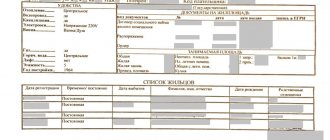Read on our website about how issues with deregistration of children are resolved if they are or are not owners, what documents need to be drawn up to remove minors from registration at the place of residence, and also about whether it is possible to deregister a child when selling an apartment.
Is it possible to expel someone else's minor child from the apartment?
In accordance with Art.
20 of the Civil Code of the Russian Federation, a citizen of the Russian Federation who has not reached 14 years of age must live with his parents or legal representatives (adoptive parents, guardians). If the mother and father are registered in different places, then the child is registered with any of them. In this case, the consent of other residents is not required (Article 70 of the Housing Code of the Russian Federation). Reference! The question of deregistering a child usually arises when selling a property. A minor can only be discharged if he is immediately registered in another house or apartment. The owner has the right to dispose of the property at his own discretion. Before the sale, he must register all registered citizens. If, when deregistering a minor, the legal norms are not observed, then his rights can subsequently be forcibly restored through the court.
Help from a housing lawyer in Yekaterinburg
The circumstances that make it necessary to evict a child from a home can be very different and the courts do not always make the same decisions, seemingly under similar circumstances.
By contacting the lawyers of our Law Office “Katsailidi and Partners”, you can count on:
- consultation on the issue of eviction of a child, taking into account your circumstances
- conducting mediation procedures with the participation of both parents or potential plaintiff and defendant
- preparing a lawsuit for eviction
- representing the client's interests in court
- request for additional evidence to be presented to the court
- appealing a court decision
- obtaining a court decision and writ of execution and presenting them to the relevant authorities for the eviction of the child and deregistration
- provision of other legal assistance in relation to the issue of eviction of a child
Please note that the truth can be both on the side of the plaintiff and on the side of the defendant. Our lawyers represent the interests not only of persons wishing to evict children, but also the interests of children and legal representatives who act in the interests of minors.
Check out options
The owner can remove a minor from his apartment in two ways:
- voluntarily with the consent of the parents;
- through the court.
Each procedure has its own characteristics.
Voluntarily
To discharge a child, the consent of both parents is required, even if they do not live together. A minor under 14 years of age must be registered at the same address where the mother or father is registered. Only his legal representative must be present at discharge.
Children from 14 to 18 years old must sign documents independently, but in the presence of their parents, guardians or adoptive parents. To deregister, you must confirm that the child will be registered in another place.
Discharge of a child voluntarily involves the following actions:
- Submitting documents to the passport office or MFC.
- Filling out the departure form.
- Receive documents on time.
- Registration of a minor at a different address.
When writing an application, you must provide the following documents:
- parents' identity card;
- birth certificate or passport of the minor;
- extract from the Unified State Register of Real Estate;
- title documents for the apartment.
The presence of the property owner when deregistering a minor is not required.
through the court
If the parents do not agree with the discharge of the child, the matter can only be resolved through the court. The claim is filed by the owner of the apartment. A minor can be deregistered only if there is a legal basis that the child’s right to use the property has been lost or terminated.
The application is submitted at the defendant’s place of residence. Guardianship authorities must participate in the proceedings.
It will not be possible to discharge a child through the court in the following cases:
- a minor participated in the privatization of an apartment;
- there is no other place to stay;
- the child has lost his parents and no guardian has been appointed;
- the minor is one of the owners;
- the child is dependent on the owner of the property.
Each situation is considered by the judge individually, so the official will not always side with the plaintiff.
Features and nuances
Let's look at several individual cases that impose their own characteristics on the registration procedure:
- The child is the owner or co-owner. In this case, the guardianship will consider both homes. The new one should be at least of equal value, and the living conditions should be no worse.
- The child is registered, but is not the owner of the privatized apartment.
IMPORTANT! Guardianship does not usually concern such matters.The design is simplified.
- The family lived in a municipal apartment . Again, permission from the guardianship authorities will be required. Without it, it will not be possible to remove the child from the register at the place of residence.
How to discharge a child from your apartment through the court?
To forcefully discharge a minor, you will need:
- Submit a claim.
- Pay a state fee of 300 rubles. (Article 333.19 of the Tax Code of the Russian Federation).
- Confirm with documents or testimony all the circumstances of the case.
- Participate in court hearings.
- Obtain a decision from an official.
- Submit documents to the registration authority.
When considering a case in court, representatives of the guardianship and trusteeship authorities are involved. If one of the participants in the process does not agree with the decision, he can appeal it within the prescribed period.
sample claim
The statement of claim is drawn up in accordance with the requirements of Art. 131 Code of Civil Procedure of the Russian Federation.
It should contain the following information:
- name of the court department;
- information about the plaintiff and defendant;
- circumstances of the case;
- evidence of violation of citizen's rights;
- plaintiff's claims;
- list of applications;
- date and signature.
List of documents
The following documents are attached to the claim.
| No. | Name |
| 1 | Passport |
| 2 | Receipt |
| 3 | Apartment purchase and sale agreement, gift, certificate of inheritance |
| 4 | Extract from the Unified State Register of Real Estate |
The plaintiff may submit other documents confirming the circumstances of the case.
court hearing
After accepting the claim, the judge will set a hearing date. Both parties are notified of the time and place. The absence of any participant at the trial without a valid reason is not a valid reason for adjourning the meeting.
After the end of the process, the parties receive a court decision. You are given 1 month to appeal it (Article 321 of the Code of Civil Procedure of the Russian Federation). If no complaint is received, it will come into force (Article 209 of the Code of Civil Procedure of the Russian Federation).
Important! After filing a claim in court, the owner must wait for the decision to enter into force. After this, he can submit documents to the registration service and discharge the child.
Where to go
The procedure for checking out of an apartment is carried out at the passport office. This is where you should go. The easiest way is to write an application to register a minor in a new place. In this case, he will be discharged and prescribed immediately. Since a minor cannot remain without parental care, one of the parents will be registered with him. If the situation is specific, passport office employees may require a court decision or permission from the guardianship authorities. Then you will have to contact these authorities.
Arbitrage practice
the child was registered by the previous owner.
There are often situations where a minor remains registered in the apartment after it was sold. So, the spouses Vitaly and Olga went to court. They purchased an apartment and agreed with the former owners that they would check out within a certain time after the deal was concluded.
The previous tenants did not fulfill their obligations. Among them was a minor child.
The new owners went to court with a demand to forcefully deregister the residents. They referred to Art. 235 of the Civil Code of the Russian Federation, which states that the previous owners had their ownership rights terminated on the basis of a purchase and sale agreement. In Art. 292 of the Civil Code of the Russian Federation states that family members of the property owner must also stop using the residential premises.
In fact, the minor lives in another apartment with his parents. The court took into account all the circumstances of the case and made a decision in favor of the plaintiff.
child – grandson or granddaughter of the owner
A grandson or granddaughter is a member of the owner's family. Therefore, it will be problematic to discharge the child. These points are indicated in the Resolution of the Plenum of the Supreme Court No. 14 of 07/02/2009.
Attention! It is believed that family ties between grandparents and a grandson cannot be terminated, even if they live separately. In this case, the child can be discharged only after he reaches adulthood.
the child is not a relative
In court, the owner can discharge a child who is not his relative. That is, it will be possible to discharge your wife’s child from her first marriage through the court after a divorce, but not your own.
In Art. 31 of the RF Housing Code states that former family members cannot use the premises unless otherwise provided in the agreement concluded between them. Therefore, the courts, in most cases, take the side of the plaintiff.
Execution of decisions on eviction and deregistration of children
After the court decision on eviction has entered into force and there has been no voluntary action to evict children from the home, the plaintiff must apply to the court to obtain a completed copy of the court decision on entry into force and a writ of execution to evict the children.
The writ of execution must be presented to the bailiffs to initiate proceedings and take action to forcibly evict children from the occupied residential premises. It is unlikely that an eviction order will only affect children as children are typically evicted with their parents, so bailiffs will work with the children's legal representatives to notify them of the eviction. In the absence of voluntary actions to leave the residential premises, persons together with their children will be forcibly evicted.
In order to discharge minors from housing, a court decision must be presented to the registration authority, on the basis of which the children will be discharged.
Underwater rocks
When discharging a minor, the following nuances must be taken into account:
- If the child does not live in the apartment, this must be indicated in the statement of claim. You should also indicate the address of the minor’s actual location if it is known.
- The summons to court arrives at the defendant’s place of residence. Accordingly, if the new address of the minor and his parents is unknown, then notifications will be sent to the disputed apartment where they are registered. The court will still consider them notified of the place and date of the hearing. If the defendant does not attend the hearing, a default judgment may be entered.
- Drawing up a claim requires legal knowledge. Experts recommend indicating in the text references to regulations that were violated by the defendant.
Cost of the procedure
Applying to government agencies requires payment of a state fee . In this case, you will need to pay 200 rubles for deregistration, and 350 rubles to the court. In addition, there may be costs for a lawyer :
- collection of necessary documentation;
- drawing up and filing a statement of claim;
- representation of interests in court and other government authorities.
The latter is not necessary, but sometimes it is extremely difficult to achieve what you want without lawyers.
Is it possible to discharge a person without his consent?
The law allows for the deregistration of a person without his consent. This happens in the cases specified in articles 31, , , , , , 101, 103 of the Housing Code of the Russian Federation. Conventionally, such situations can be divided into two types - a person has not acquired the right to use housing, or has lost such an opportunity.
There are two ways to discharge a person from an apartment without his consent:
- pre-trial;
- claimable.
Recognition as not having acquired the right to use
The basis for moving into a municipal apartment is a social tenancy agreement. If a social tenancy agreement is not concluded, then the person does not acquire the right to use the residential premises .
But concluding an agreement is not enough. It is necessary to comply with the requirements of Article 70 of the RF Housing Code. It states that the tenant has the right to move other people into the premises only with the consent of his family members, including those temporarily absent, who are registered in the apartment. A prerequisite is a written consent form.
Attention! The consent of other persons is not required if their minor children move in with parents. The civil status of the father and mother does not play a role. That is, they may not be married to each other.
Another criterion for the legality of residence is the legal capacity of the participants. If one or both of them do not have the right to make transactions personally, for example, are legally incompetent, then the participation of legal representatives is necessary. Otherwise, the agreement will be void, and the person will not receive the right to move into the apartment.
Recognition as having lost the right to use
Loss of the right to use an apartment may occur due to the following reasons:
- expiration of the lease agreement;
- consent of the parties to the transaction;
- entry into force of a court decision.
These circumstances arise for various reasons:
- death of a person;
- conscription;
- the presence of arrears in paying for housing and communal services for more than six months;
- damage or destruction of the apartment by the tenant or persons living with him;
- systematic violation of the rights and legitimate interests of neighbors, which makes it impossible to live together in the same residential premises;
- using residential premises for purposes other than their intended purpose, for example, organizing production in an apartment.
That is, in fact, the person used the premises, but when the specified circumstances arose, he lost such a right.
How to obtain permission from the guardianship authorities?
The removal of a minor from the living space requires approval from the guardianship and trusteeship authority. To obtain permission, both parents must contact the Office of Guardianship and Trusteeship, except in situations where one of them is deprived of parental rights. The application indicates the new place of registration. Documents for new housing are provided as confirmation.
Attached to the application:
- passports of the child’s representatives;
- birth certificate or passport (upon reaching 14 years of age) of the child;
- an extract from the personal account at the old place of residence;
- documents for new housing.
Review of documents takes up to 2 weeks. Then the applicants are invited to the guardianship and trusteeship authority for an interview and obtaining permission or prohibition. If the child is over 14 years old, he must also be present.









